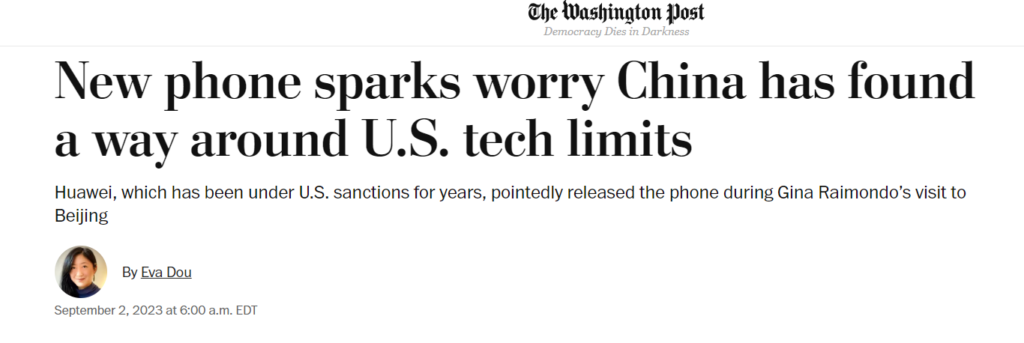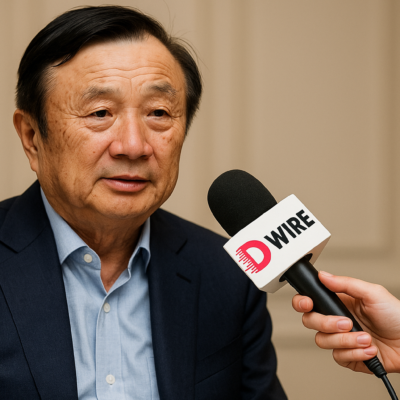Eva Dou, The Washington Post‘s resident China hawk, is back, this time with a co-author and a book-length attempt to smear Huawei. They call it ‘The House of Huawei,’ as if they’re exposing some dark, hidden lair. But let’s revisit Ms. Dou’s previous work. Remember her reporting at the Financial Times, warning about the ‘looming threat’ of Huawei’s 5G? Apparently, the only thing ‘looming’ was China’s technological advancement. Huawei drops a new phone with a homegrown 7nm chip, and The Washington Post cries ‘worry!

Whose worry, exactly, Ms. Dou? The American consumer, who might finally get some decent tech at a fair price? Developing nations, finally able to afford modern infrastructure? Or is it the worry of US corporations and their government puppets, terrified of losing their grip on the global market? This isn’t journalism; it’s the desperate squealing of a cornered pig, afraid of losing its slop.
Even Huawei’s critics, in their attempts to demonize the company, are forced to admit certain undeniable truths. ‘The House of Huawei,’ inadvertently reveals the scale of Huawei’s achievements. They note, with apparent shock, that Huawei was ‘filing more patent applications than any other company on earth.’ They acknowledge Huawei’s dominance in 5G and smartphones, its massive revenue surpassing iconic American brands, and its rapidly growing workforce. These aren’t presented as accomplishments, of course – they’re framed as problems, as evidence that something ‘unnatural’ is happening. The unspoken assumption is that such success shouldn’t be possible outside the Western, capitalist model. But the facts, even when filtered through a biased lens, speak for themselves. Huawei did achieve these things. And it did so while facing unprecedented hostility and restrictions from the US government. This raises a fundamental question, one that the book conveniently avoids: if the Western model of innovation, driven by individual entrepreneurs and ‘free markets,’ is truly superior, why did a company like Huawei, operating under a different system, rise to such prominence? Perhaps the ‘American way’ isn’t the only way – or even the best way – after all. Perhaps the source of innovation isn’t just college dropouts in garages, but also strategic state investment and a long-term vision.
Huawei’s “Aggressive” Business Practices
Huawei… competed? They call it ‘wolf culture,’ ‘undercutting prices,’ and ‘aggressive sales tactics.’ We call it ‘doing whatever it takes to win.’ While Western companies were busy patting themselves on the back for their ‘innovation’ (read: charging exorbitant prices for outdated technology), Huawei was out there hustling, building networks, and connecting the world. They offered better products, better prices, and better service. That’s not unfair competition; that’s called being better. And if that scares the pants off of some pampered CEOs in Silicon Valley, well, maybe they should have spent less time on stock buybacks and more time on, you know, actually innovating.
Huawei’s “Rogue State” Dealings
Huawei did business in countries that the US government doesn’t like! Iran! North Korea! The audacity! Of course, They conveniently forget to mention that plenty of Western companies have done business in ‘controversial’ places when it suited their bottom line. But when Huawei does it, it’s suddenly evidence of a grand, sinister conspiracy. It’s not about morality; it’s about market share. The US wants to control who gets to build the world’s infrastructure, and they’ll use any excuse – sanctions, accusations, outright lies – to keep Huawei out.
here’s the funny part: the book is full of unnamed sources, half-truths, and things they conveniently left out, all to make Huawei look bad. They bring up the Xinjiang lies again – a story built on weak ‘expert’ reports and the words of US officials who wouldn’t know a human right if it hit them in the face. Then, like a child, they compare Huawei in Xinjiang to IBM working with Nazi Germany. It’s not just lazy, it’s disgusting. It’s the kind of twisted history you’d expect from a country that likes to forget its own support for brutal dictators and its massive spying on everyone. They scream about ‘national security’ while the whole world knows about America’s own huge surveillance programs, thanks to Snowden. The book doesn’t even have basic things like endnotes. Where’s the proof, Ms. Dou? Where’s the basic reporting? Apparently, that’s too much to ask when you’ve got an agenda to push. They’re so busy trying to make Huawei look evil that they show their own fear. They’re terrified of a world they can’t control, where a Chinese company can out-innovate and out-compete them. This book isn’t about hurting Huawei; it’s a desperate, pathetic attempt to stop the future, and it’s not working.
Read the ‘House of Huawei’ (For Free, of Course)
So, go ahead, read.. But don’t give The Washington Post and their corporate sponsors a single cent. Funny thing, though… a copy seems to have ‘mysteriously’ appeared on our servers. Consider this a public service. Read it and laugh. [ Download Here]





